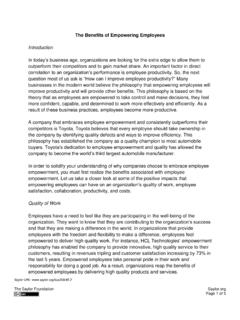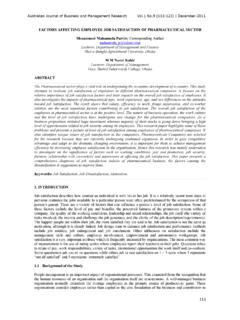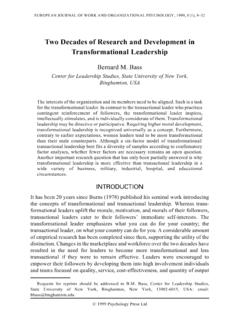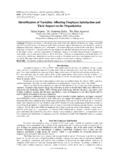Transcription of Employee Perceptions of Talent Management Effectiveness …
1 Global Business and Management Research: An International Journal Vol. 9, No. 3 (2017) 46 Employee Perceptions of Talent Management Effectiveness on Retention Lee-Anne C. Johennesse* College of Business, Southern Taiwan University of Science and Technology, Tainan, Taiwan Email: Te-Kuang Chou College of Business, Southern Taiwan University of Science and Technology, Tainan, Taiwan * Corresponding Author Abstract Purpose: The main purpose of this study is to understand how Talent Management processes contribute toward effective performance Management , with regard to Employee retention in Taiwanese companies. This research aims to study the value that employees place on their job design through training, performance assessment through feedback, accountability and responsibility through empowerment , equity of compensation by remuneration, and business coaching program utilization.
2 Design/methodology/approach: This theoretical paper, and the conceptual model proposed in this study will be based on Employee experiences, and Perceptions of Talent Management processes on their retention. The planned data regarding these factors will be collected quantitatively through questionnaires completed by employees in listed Taiwanese companies. Findings: The proposed study will provide a review of the extant literature, as well as provide empirical evidence with regard to critical HR policies that have significant impact on the Management of Employee retention practices. Originality/value: This study aims to provide companies with a guide in targeting the most important factors that impact on their Employee retention, through an increased awareness and knowledge of how employees are motivated, and thus retained accordingly. Moreover, this case study will be the first of its kind conducted in Taiwan, as it includes core HR retention practices, as well as business coaching processes (which are relatively unutilized in broader Asian contexts).
3 Furthermore, it is anticipated to cover a large sampling of the main industries listed broadly on the Taiwanese Stock Exchange, and offer HR policy implications. Keywords: Human Resource Practices, Talent Management , Retention, Introduction The global crisis of 2008, and subsequent economic recessions, have resulted in a multitude of companies having to reduce their Employee levels, by significant downscaling. Current challenges include immense organizational transformations, the rapid paced advancement of technology and unstable environments, which are further manifested by constant tumult in the economy. Consequently, Employee loyalty, efficiency and turnover concerns are extremely significant Global Business and Management Research: An International Journal Vol. 9, No. 3 (2017) 47 Management challenges (Dhanraj and Parumasur, 2014). Additionally, this is impacted by Employee commitment, organizational restructuring and competition for capable Talent (King, 2015).
4 Furthermore, the retention of Generation Y employees in vulnerable, uncertain, complex and ambiguous (VUCA) environments are immense challenges which organizations are also confronting (Aruna and Anitha, 2015). Decreased organizational stability creates fragility, with an influence on relationships with customers; managers are pressurized, conflict is inexorable, and productivity is impacted. These challenges effect organizational competitiveness, creating difficultly for organizations to compete in the marketplace (Lado and Wilson, 1994; Wright, McMahan and McWilliams, 1994) The most valuable, and volatile asset of organizations, is constant, efficient and loyal employees (Elliott, 2004). Employee durability enables organizations to have significant advantage, and power through expertise and experience. Employing, and retaining the most suitable and capable employees is critical, this is why Employee recruitment processes are fundamental, with regard to cost saving mechanisms relative to Employee retention.
5 It is therefore imperative that employers are certain of candidate suitability for employment, the reasons that they are selected, and consequently how they are managed (Arnold, 2005). Vast competition exists throughout industries and markets. It is thus important for organizations to strategically manage their employees performance, due to the impact of sustainability. It is widely believed that highly talented employees are significant to organizational success. Therefore Talent Management processes are fundamental and key. Efficient performance measures may assist companies to integrate competitive assets to its fullest extent. Moreover, firms that invest in Talent Management performance strategies, which include Employee development and potential maximization, position themselves for greater success (Cascio, 2014). Taiwan s business landscape is confronted by three major challenges.
6 Firstly, many senior managers will be retiring in the next ten to fifteen years. This means that the current generation of Talent will transition to the next phase, and job readiness is critical. Secondly, Taiwan s birthrate has been declining, and is ranked as one of the lowest globally. This creates a situation of a declining HR pool, where the available talented employees will further decline. Thirdly, the brain-drain syndrome also characterizes Taiwan, whereby many experienced, and skilled people seek opportunities away from Taiwan, thus further decreasing the availability of much needed competencies. These challenges represent a need for Taiwanese companies, whether small, medium, or large, to not be victims of a Talent vacuum. Moreover, it also creates an opportunity for companies to be competitive in their environments, and sustainable from a people Management perspective. A solution to the above-mentioned possible organizational crisis is for Taiwanese companies, to first acknowledge the risks associated with the current situation, and then to address these risks.
7 This can be achieved by harnessing Talent pipelines through the development of enhanced Talent Management practices, which will support Employee retention. Employees are the core of an organization, therefore it is fundamental to retain them to ensure the success of the organization. Companies endeavor to implement Human Resource strategic plans to satisfy Employee requirements regardless of the nature and size of the organization (Huselid, 1995). This paper seeks to contribute to the existing literature regarding Employee retention. Practically, this study provides organizations with policy recommendations to specifically impact the most significant influences of Employee retention. Taiwanese firms (and other Asian counterparts) Global Business and Management Research: An International Journal Vol. 9, No. 3 (2017) 48 seldom include business coaching initiatives as part of their HR strategies, accordingly, this paper provides an opportunity for these companies to be more competitive, and sustainable from a retention perspective.
8 Moreover, previous studies conducted within a Taiwanese context include specific and limited company sectors, the value of this study aims to include a larger and broader sampling of the main industries listed on the Taiwanese Stock Exchange. Literature Review Employee Retention Employee retention signifies the practices and processes utilized in managing valuable employees so that they don t leave their positions within organizations. It incorporates steps taken to motivate and encourage employees to remain and function, optimally in the organization for the longest period of time (Hausknecht, Rodda and Howard, 2009). It is imperative that skilled, and knowledgeable staff are recruited and managed effectively, because the retention of people is of critical significance. This is important, as many employers often under estimate the costs incurred with the replacement of employees. The costs can include reference checks, temporary worker costs, training costs and Employee induction expenses.
9 Other concealed costs, such as unfulfilled deadlines, loss of organizational knowledge, decreased morale, and clients undesirable Perceptions of company persona may also be resultant. For these reasons, retaining valuable personnel is a primary endeavor for many companies. If employers do not carefully manage the retention of their staff, organizations may be challenged by understaffing, as well as ineffective and inefficient employees, thus directly impacting on the competitiveness, success and sustainability of these organizations (Tziner and Birati, 1996). Vast research continues to explore the determining factors as to why people leave their jobs, and to date there has been limited and broad consistency in findings. There are numerous reasons why people vacate their positions for alternative employment. Factors such as job anxiety, limited loyalty to the organization; and job dissatisfaction are often outcomes driving resignations.
10 If there are insufficient opportunities for employees to be developed and be trained, this may result in low morale, which may lead to resignations. Research also indicates that if employees are happy and satisfied, they will build relationships within their organizations, and this is important for organizational performance. Team building processes are also effective in this regard. It is essential that Management foster Employee job satisfaction , which impacts on retention levels. Another aspect to take into consideration, is the level of customer satisfaction . This is also dependent on Employee satisfaction , because this relationship is of considerable significance to the organizational sustainability (Han, 2008) Retention processes are important organizational objectives, as they impact profits, and consequently organizational goals and objectives. This is because retention offers the opportunity to decrease costs for further recruitment and training processes.







